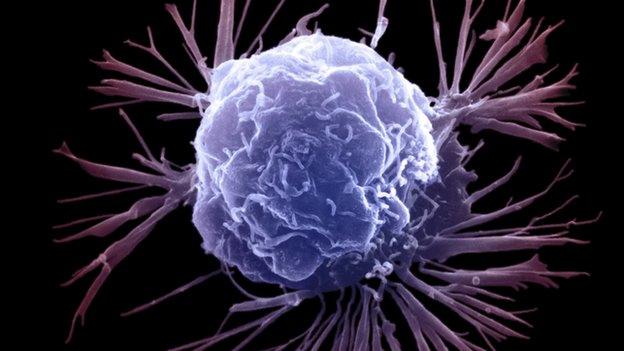Labour pledges cancer therapy fund
- Published
- comments
.jpg)
Breast cancer cells
A new fund to pay for innovative cancer drugs, surgery and radiotherapy would be set up if Labour comes to power.
It would replace the Cancer Drugs Fund in England - a key part of David Cameron's 2010 election campaign - when it runs out in 2016.
Shadow health secretary Andy Burnham said he wanted "the best health service in the world" for cancer.
The Conservatives said it was an "unfunded promise" giving "false hope" to patients.
A Conservative source said that as long as David Cameron remained PM the cancer drug fund would continue to be funded.
Health Secretary Jeremy Hunt said England's track record on treating cancer had improved under the current government.
"Helping more people survive cancer is a key priority for this Government - and it's hugely welcome that we're on track to meet our goal to save an extra 5,000 lives," he said.
Expensive drugs
Many cancer treatments are not cost-effective enough for the NHS to make them routinely available.
They include the breast cancer therapy Kadcyla, which extends life by an average of six months and costs £90,000 a course.
Prime Minister David Cameron set up a £200m-a-year pot of money in 2010, now extended to £280m, to give patients access to expensive drugs, irrespective of cost.
However, the long-term future of the Cancer Drugs Fund is in doubt as the funding runs out in 2016.
In a speech at the Britain Against Cancer conference, Mr Burnham will announce that a "Cancer Treatments Fund" would take its place under a Labour government.
It would be worth £330m-a-year and improve access to all forms of innovative cancer therapies.

Breast cancer scans
Mr Burnham is expected to tell the conference that the Cancer Drugs Fund took resources away from other life-saving therapies.
"My goal is to make the NHS the best health service in the world for the treatment of cancer. We will only achieve that if we give patients access to the most effective forms of treatment, particularly advanced radiotherapy," he will say.
"The problem with cancer policy under the current government is that it prioritises one form of cancer treatment over others and places one group of patients ahead of another.
"This is indefensible when we know surgery and radiotherapy are responsible for nine in ten cases where cancer is cured.
"It is not right that 40,000 people every year who could benefit from radiotherapy are missing out."
'Huge U-turn'
Labour's proposal could mean increased access to advanced forms of radiotherapy such as intensity modulated radiotherapy and stereotactic ablative radiotherapy.
Both are available to some NHS patients, but not all.
Mr Burnham will also announce that a Labour government would publish a new cancer strategy within six months of being elected.
Previous Labour promises on health include a £2.5bn funding pledge to pay for 36,000 more doctors, nurses and midwives, and cutting waiting times for cancer tests and the results to under a week.
A Conservative spokesman said: "This represents a huge u-turn for the Labour party, who only a few weeks ago said they didn't support the Cancer Drugs Fund in England and are still denying it to NHS patients in Wales.
"While their new-found support for the fund is welcome, the public deserve better than unfunded promises that give false hope to cancer patients."
'Best treatments'
Sarah Woolnough, Cancer Research UK's executive director of policy, said: "We're delighted to see a commitment to investing in radiotherapy and surgery, as well as focusing on some of the issues facing both teenage and older cancer patients.
"We know that one of the main reasons our cancer outcomes lag behind other countries is because patients are not getting access to the best treatments."
She added: "We also need to see a continued commitment to diagnosing more cancers early. Surgery and radiotherapy are more likely to be effective when the disease is diagnosed in the earliest stages.
"Early diagnosis and access to treatment must be key priorities for a future government if it's serious about improving the UK's cancer survival rates."
- Published12 November 2014

- Published27 August 2014
- Published29 October 2014
